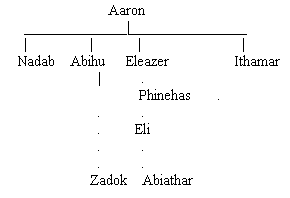|
June
23
|
Reading 1 - 1Samuel 2
Peter Cresswell
Peter Cresswell
v.5
The
idea of the hungry being fed is seen as:- 'he hath filled the hungry
with good things' [Luke
1:53] The idea
'borne
seven' is picked up [Jeremiah
15:9] to show
the desolation of the priesthood at the time of the captivity. Remember
that Jeremiah was a priest.
v.6
The Lord kills and makes alive is a quotation from [Deuteronomy
32:39]
v.31
The sons of Eli were evil, therefore Yahweh promises that he will replace
the sons of Eli [Levi] with a faithful priesthood. In fact this turns
out to be Zadok as explained in [1
Kings 2:27 - 35]
The genealogy is thus:

The removal
of Abiathar is the fulfilment of 1
Samuel 2:31
Peter Forbes
Peter Forbes
Peter Forbes
Reading 2 - Isaiah 48
Peter Cresswell
Peter Cresswell
Peter Forbes
48:10
I have refined Zechariah 13:9
Peter
Forbes
Peter Forbes
Reading 3 - Revelation 5 & 6
Peter Cresswell
5 v.10 The redeemed sing a new song because they have been made 'kings and priests'. This is our calling. As such our life now is the training ground for priesthood. The priest in Israel was able to understand the needs of the offerer because he was human as the offer [see Hebrews 5:1-2]. Thus as we learn how to deal with our own weakness now we will be able to succour the mortal population in the Millennium. So our chastening and our weaknesses are not just 'chance happenings' They are ordained by our Father that we will be able to minister in the age to come.
6
v.15-17 During
the sixth seal, when 'the
wrath of the lamb' is seen the 'important' men on the earth try to
hide from that wrath. On the other hand the servants of God are invited
to hide until the indignation be overpast [Isaiah
26:20] showing
that Yahweh's judgements are not indiscriminate. He cares for His children.
Peter Forbes
|
lion
of ... Judah
|
Gen
49:9
|
|
|
root
of
|
Isa
11:1
|
|
|
four
beasts
|
Eze
1:5
|
|
|
lamb
as it had been slain
|
Isa
53:7
|
The way in which these four passages have been drawn together by the Spirit
in Revelation 5 is most interesting.
The blessings of Jacob are linked with the promise of the righteous king (Isaiah 11) who is a manifestation of the glory of God (Ezekiel 1) who has this wonderful exalted position because he has been raised from the dead (Isaiah 53)
|
and
I saw ... white horse
|
Zech
1:8 6:3
|
|
|
horse
that was red
|
Zech 1:8 6:2
|
|
|
a
black horse
|
Zech 6:2
|
|
|
a
pale horse
|
Zech
1:8 6:3
|
The cluster of quotations from Zechariah focuses our attention on the
horsemen of Zechariah. Consequently, if we understand the horsemen of
Zechariah we will appreciate the significance of the horses in Revelation
6. Zechariah explains what each one is to do.
Peter Forbes
5:13-14 So the elders again state their adoration of the risen Jesus as we saw in Chapter 4.
6:10
Do we regularly echo this cry? Are we longing for the return of Christ
- or is life too comfortable and are there so many tings we want to do
that the coming of Christ is of secondary importance to us?
Peter Forbes